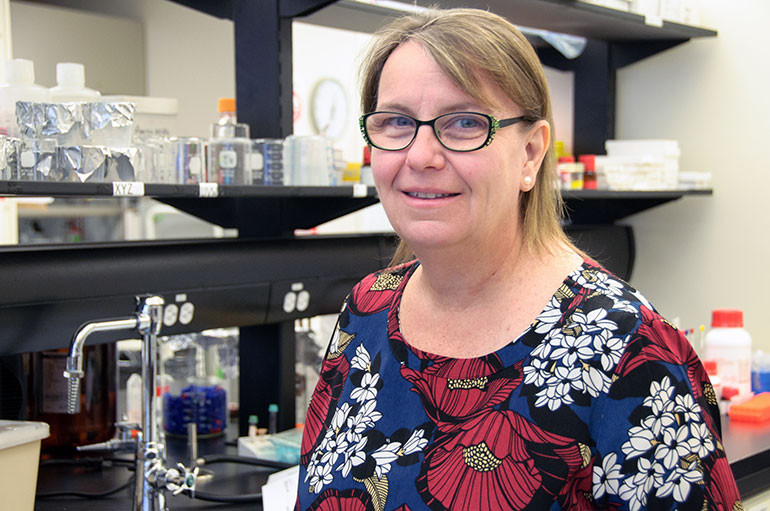UBC researcher Bryn Crawford holds a sample sheet made with flax bio-waste. The black spots on the sheet indicate mould growth.
Mould on a substance will affect its strength and durability
When something goes mouldy in the fridge, it is annoying and wasteful.
However, at UBC Okanagan’s School of Engineering, mould is proving increasingly important in the domain of engineering materials and can lead to early deterioration and structural failure. This is especially the case as manufacturers adopt more bio-derived materials in the drive towards a greener future, explains researcher Bryn Crawford.
At UBC’s Okanagan campus, a multi-disciplinary team of researchers from the Composites Research Network and the Department of Biology, in collaboration with MIT and the National Research Council of Canada, have been studying the development and application of bio-sourced composites—specifically flax and hemp fibres. These materials are plentiful in Canada and can be mixed with other materials to create cheaper, recyclable, and effective composite material products that are used by a range of industries, including in transportation.
“Canada has a lot of biomass that can be used to produce materials that are both light and inexpensive,” explains Crawford. “We’re looking at ways of using biomass in engineering, but there is a level of natural deterioration in these products that is still not fully understood.”
In the study, researchers conducted a number of experiments to determine if and when mould will grow on bio-materials and how it might affect the final product.
“When we bring microbiology into engineering, it raises some extra questions; some questions we’ve never thought about before,” says Crawford. “But because we’re now using biological matter, we have to think of fungal growth and how this fungal growth will affect a product.”
The research team examined flax and hemp fibres alongside other natural materials to determine what would happen over time to these fibres. They created ‘fibre sheets’ and then added fungi to some, water to others, and left another group of sheets untreated.
Crawford says they are not surprised that the materials grew mould; the idea of the project was to determine the types of environment where the fungal spores would grow and then test mechanical properties of the affected materials. The team conducted a variety of tests examining them for strength, stiffness, or the amount of energy that can be absorbed before the materials failed. They also used scanning electron microscopy to take an extreme close-up of the interior of the sample to determine fungal growth patterns, examine fractures, and failure zones.
“It was a huge experiment and we found that in both the hemp and flax fibres, when no fungi were added, we still had fungi growing,” Crawford adds. “Basically, when raw natural fibres are exposed to high relative humidity, mould will grow and the potential for premature structural failure can occur.”
Crawford says that this susceptibility to mould growth is important for supply chains and factories to understand and manage in order to ensure they’re creating robust products.
“Bio-composites made from natural fibres are good for both the environment and the economy and could help usher in the next revolution in manufacturing. More inter-disciplinary research of this kind is vital to producing high-quality and durable bio-materials that help make that leap.”
The research was recently published in Materials and was partially funded by the Natural Sciences and Engineering Research Council of Canada and the Fonds de recherche du Québec—Nature et technologies. It was conducted in collaboration with Sepideh Pakpour, Negin Kazemian, John Klironomos, Karen Stoeffler, Denis Rho, Joanne Denault and Abbas Milani.
About UBC’s Okanagan campus
UBC’s Okanagan campus is an innovative hub for research and learning in the heart of British Columbia’s stunning Okanagan Valley. Ranked among the top 20 public universities in the world, UBC is home to bold thinking and discoveries that make a difference. Established in 2005, the Okanagan campus combines a globally recognized UBC education with a tight-knit and entrepreneurial community that welcomes students and faculty from around the world. For more visit ok.ubc.ca.
The post New research finds that mould can infiltrate and weaken bio-composite materials appeared first on UBC's Okanagan News.


